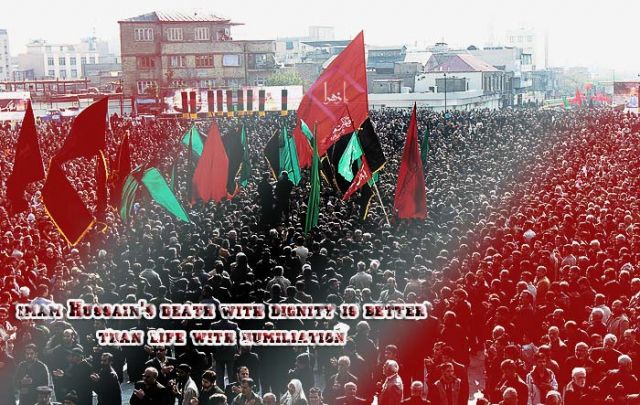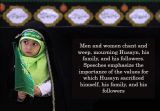
عن الصادق (ع): والله لو عرف الناس فضل هذا اليوم بحقيقته لصافحتهم الملائكة في كل يوم عشر مرات … وما اعطي الله لمن عرفه ما لايحصي بعدد. مصباح المتهجد: ۷۳۸
امام صادق (ع) فرمود: به خدا قسم اگر مردم فضيلت واقعي «روز غدير» را ميشناختند، فرشتگان روزي ده بار با آنان مصافحه ميكردند و بخششهاي خدا به كسي كه آن روز را شناخته، قابل شمارش نيست.
موضوعات: علما
 نظر دهید »
نظر دهید » 
عن جعفر، عن ابيه (ص) قال: ان ابليس عدوالله رن اربع رنات: يوم لعن، و يوم اهبط الي الارض، و يوم بعث النبي (ص) و يوم الغدير. قرب الاسناد:
امام باقر (ع) از پدر بزرگوارش امام صادق (ع) نقل كرد كه فرمود: شيطان دشمن خدا چهار بار ناله كرد: روزي كه مورد لعن خدا واقع شد و روزي كه به زمين هبوط كرد و روزي كه پيامبر اكرم (ص) مبعوث شد و روز عيد غدير.
موضوعات: بدون موضوع
 نظر دهید »
نظر دهید » 
با همهی سختی هایش عمری را با چادرش زندگی کرده بود و هیچ وقت حاضر نبود حجابش را ترک کند. میگفت:"من نمیتوانم بدون چادر جلوی نامحرم باشم.” از دیدن زنان بد حجاب ناراحت میشداما میگفت زندگی آنها به من ربطی ندارد هر کسی را در قبر خودش میگذارند. حتی با آنها رفت واآمد میکرد و به مهمانیشان میرفت، ولی هیچ وقت ناراحتی خودش را ابراز نمیکرد. فکر میکرد اعتراض او باعث از هم پاشیدن روابط فامیلیشان میشود.حالا بعد از گذشت سالها و بزرگ کردن فرزندانش وقت استراحتش بود. اما اظطراب نمیگذاشت او یک لحظه آرامش داشته باشد. تمام فکر و ذهنش به دختران بد حجابش بود و اینکه هر چه برایشان در مورد حجاب توضیح میداد گوششان بدهکار نبود. وقتی مادر شروع به نصیحت میکرد بچه ها می گفتند:"چرا شما اینقدر به ما گیر میدی. دخترهای فامیل هم مثل ما هستند ولی مادراشون به اونا گیر نمیدن.
پی نوشت؛
“قال رسول الله صلى الله علیه و آله : “لا یَزالُ النّاسُ بِخَیرٍ ما أمَروا بِالمَعروفِ وَنَهَوا عَنِ المُنکَرِ وَتَعاوَنوا عَلَى البِرِّ وَ التَّقوى فَإذا لَم یَفعَلوا ذلِکَ نُزِعَت مِنهُمُ البَرَکاتُ، وَ سُلِّطَ بَعضُهُم عَلى بَعضٍ و َلَم یَکُن لَهُم ناصِرٌ فِى الأرضِ وَ لا فِى السَّماءِ"تا زمانى که مردم امر به معروف و نهى از منکر نمایند و در کارهاى نیک و تقوا به یارى یکدیگر بشتابند در خیر و سعادت خواهند بود، اما اگر چنین نکنند، برکتها از آنان گرفته شود و گروهى بر گروه دیگر سلطه پیدا کنند و نه در زمین یاورى دارند و نه در آسمان.(تهذیب الاحکام، ج6، ص181، ح22)
موضوعات: داستانی
 نظر دهید »
نظر دهید » 
چرا گاهی نوزاد بی دلیل میخندد یا بدون درد میگرید؟?مفضل بن عمر می گوید:از امام صادق علیه السلام پرسیدم: چرا گاهی نوزاد بیدلیل میخندد یا بدون درد میگرید؟? فرمودند:♻️ای مفضل! هیچ طفلی نیست مگر اینکه امام را میبیند و با او نجوا میکند،? پس گریهاش بخاطر رفتن امام از پیش اوست و خندهاش بخاطر آمدن امام نزد او،?اما وقتی زبانِ طفل، به سخن باز شد ، این باب بر او بسته میشود و بر قلبش مهر فراموشی زده میشود.
?علل الشرایع؛شیخ صدوق(ره)
موضوعات: علما
 نظر دهید »
نظر دهید » 
Hazrat Abulfadhl Al-Abbas’s loyalty was most clearly manifested when he went to the Euphrates River but abstained from drinking water. The well-known narration of the event, which is widely related to by the people, is that Imam Hussain (as) sent Hazrat Abulfadhl to fetch water. However, what I have read in authentic versions of the narration—like those of “Irshad” by Mufid and “Lohoof” by Ibn Tawous—is slightly different from the common narration, probably highlighting the significance of the event. In these authentic books it has been narrated that in the last moments, rather in the last hour, while thirst had compelled the little children so much–little girls and others in the camps–that Imam Hussain (as) and Abulfadhl (as) took it upon themselves and left together to fetch water. Hazrat Abulfadhl did not go alone, in other words; Imam Hussain (as) accompanied Abulfadhl towards the Euphrates River—a branch of the Euphrates which flowed through that region—in hopes of obtaining water for the camp site.
These two courageous and strong brothers fought while backing each other on the battle field. Imam Hussain (as) was about sixty years old, but he was among famous unique men in terms of his power and courage. His brother Abulfadhl al-Abbas was in his 30’s with all these outstanding features known to everyone. These two brothers would fight side by side, and back to back, in the midst of the enemy’s army, moving into the waves of enemy lines, breaking them. They did so in order to reach to the Euphrates in hopes they could get some water. It was in the midst of this challenging battle that Imam Hussain realized, suddenly, that the enemy had created a gap between him and his brother Abulfadhl Al-Abbas. It was also in the midst of those tough moments that Abulfadhl got closer to water and reached the Euphrates. As it has been narrated, he filled the water pouch to take it back to the camp. Anyone would agree he had the right to drink a fistful of water to sooth his own thirst, but he demonstrated his loyalty in that moment.
When Abulfadhl Al-Abbas was filling his palms with water, when he looked at the water, he remembered Imam Hussain’s lips, dry from thirst; maybe he remembered the little girls and other children screaming out for thirst. Maybe he remembered Ali Asghar crying out for thirst and he could not allow himself to drink water. He poured the fresh water onto his hands, it seeped out and back into the river before he left. It was when he was leaving the river that the enemy targeted him, and all those horrible events unraveled. Suddenly Imam Hussain (as) heard his brother from the midst of the enemy’s army calling out to him: “O’ Brother! Help your brother!”
Ayatollah Khamenei, April 14, 2000
موضوعات: شهدا
 1 نظر »
1 نظر » 
